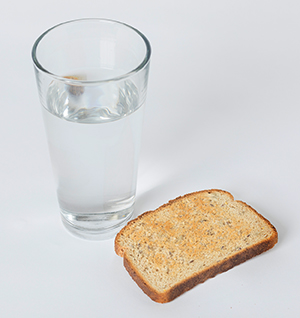Cancer Care- Controlling Diarrhea
Oncology: Controlling Diarrhea
A common side effect of cancer and cancer treatment is diarrhea. This is when you have loose, watery stools more often than usual. There are many things that can cause diarrhea, such as:
-
Chemotherapy
-
Radiation therapy to the belly or pelvis
-
Medicines, such as antibiotics
-
Infection
-
Stress
Diarrhea can cause you to quickly become dehydrated. It can also change the balance of nutrients and minerals in your body. To help limit this problem, try the tips on this handout.

Tips for controlling diarrhea
These steps can help you keep diarrhea from starting or getting worse:
-
Limit the amount of fiber in your diet. Don't eat high-fiber foods such as whole-grain bread and brown rice. Instead, eat white bread and rice.
-
Eat foods rich in potassium, such as bananas and oranges. This can help replace electrolytes lost due to diarrhea.
-
Eat small, frequent meals.
-
Drink plenty of fluids. Water, juice, sports drinks, and flat light sodas, such as ginger ale, are best. They can help replace fluids lost due to diarrhea.
-
Stay away from coffee, tea, and alcohol.
-
Don't eat foods that are fried, greasy, spicy, or sweet.
-
Limit milk products and how much milk you drink.
Medicines can help
Ongoing diarrhea is not something you have to live with. And it can become harmful. Talk with your healthcare provider about:
- Your risk for diarrhea
- What you can do to try to prevent it
- What you should do if it starts
- Use an ointment to soothe irritation.
- Keep the anal area clean with a mild soap or baby wipes.
When to call your healthcare provider
See your healthcare provider if any of these happen:
-
The diarrhea lasts more than 24 to 48 hours.
-
There is blood in your stool or when you wipe.
-
You have pain in your belly.
-
You become lightheaded or dizzy.
-
Your urine turns very dark or you stop urinating.
-
The medicine you were given to stop diarrhea is not working.
Updated:
August 27, 2020
Reviewed By:
Richard LoCicero MD,Lu Cunningham RN BSN,Lu Cunningham RN BSN